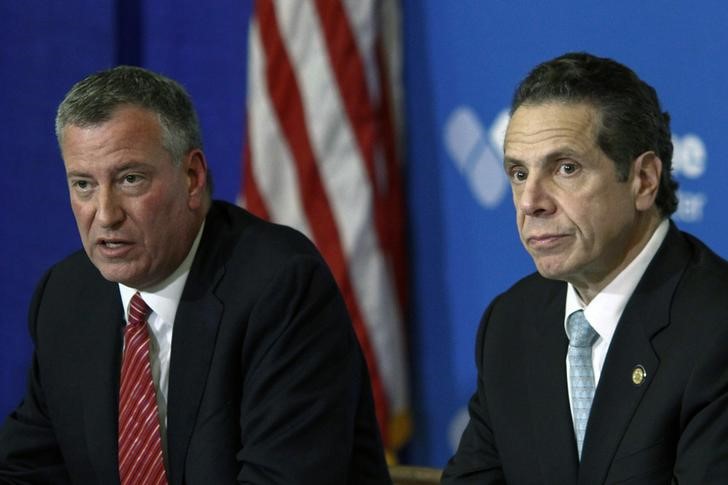By Laila Kearney
NEW YORK (Reuters) - The governor of New York and mayor of New York City unveiled an agreement on Saturday to close a gap in funding a $26.1 billion capital plan for the region's deteriorating mass transit system, settling their differences over how to split the cost.
For months, Governor Andrew Cuomo and Mayor Bill de Blasio have sparred publicly over how much the city should pony up to fund the five-year plan for the Metropolitan Transportation Authority, which runs the city's subway, bus and suburban rail lines.
The agreement calls for the state to commit $8.3 billion and the city to commit $2.5 million, more than it initially offered, toward closing the plan's funding gap.
"The MTA is the lifeblood of New York," Cuomo said in a joint statement with de Blasio. "This MTA Capital Plan is what we need to make the system smarter and more resilient."
Sounding a note of reconciliation with the governor, de Blasio said he looked forward to working with Cuomo and the MTA "to ensure a transit system that reliably, effectively, and safely serves all of its riders."
Cuomo had demanded that the city bump up its contribution, saying its residents make up the majority of the aging system's ridership.
When the plan was introduced in 2014, the gap stood at around $15 billion. The agreement announced on Saturday would bring the shortfall to $700 million. The MTA is expected to make up the rest through dedicated revenue streams and possible program reductions, according to the statement.
The plan, which still requires approval by the MTA board, will pay for the maintenance and expansion of infrastructure and to buy new subway carriages, commuter rail cars and buses to alleviate transportation congestion and delays. The money will also go to repairs for track systems, signals, support structures, bridges and tunnels.
Some of the damage dates back to Superstorm Sandy, which crippled the system in October 2012.

A representative of the Straphangers Campaign, an advocacy group for mass transit riders that earlier criticized officials for failing to close the funding gap, was not immediately available for comment.